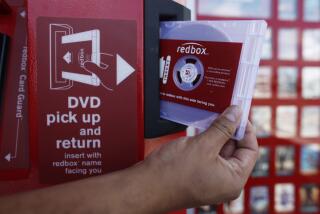Warner Bros. relents, agrees to Redbox DVD deal
Unable to get the rest of Hollywood behind its plan to make Redbox wait nearly two months after movies go on sale to rent them, Warner Bros. has compromised with the DVD kiosk giant.
Beginning next year, Warner will let Redbox offer its DVDs and Blu-ray discs 28 days after they go on sale, the same “window” followed by most other major studios. In exchange, Redbox has agreed to help promote the Ultraviolet digital download initiative and to buy a large number of Warner Bros. movies for its soon-to-launch video-on-demand initiative.
Believing that inexpensive rentals discourage consumers from more profitable DVD purchases or video-on-demand rentals, Warner was the first studio to require Redbox and Netflix to wait 28 days to rent its moves, beginning in 2010.
When that deal expired early this year, Warner pushed to extend the window to 56 days. Netflix agreed but Redbox would not. As a result, the studio stopped selling its discs to the kiosk company in an effort to force its hand.
Redbox retaliated by buying Warner DVDs from retailers and other distributors, paying more for the individual discs but getting them closer to launch date.
Warner Bros. had hoped other studios would join in its effort to hold the 56-day line. But in April, when its contract with Redbox came up for renewal, Universal Pictures agreed to extend its 28-day arrangement, dashing Warner Bros.’ hopes of industrywide pressure. 20th Century Fox, whose Redbox deal expires early next year, also appears unlikely to join the 56-day push.
“When we didn’t have any other studios follow suit and they were able to source our product in another, expensive way, it wasn’t ideal for them or us,” said Warner Home Video President Ron Sanders. “The combination of benefits [under the new deal] we thought outweighed the benefits of continuing to fight.”
Redbox will pay more to acquire Warner DVDs under the new agreement than it did under the two companies’ prior deal, Sanders added.
“We were successful in our work-around and willing to be in it for as long as needed, but the desired outcome is to be in a good relationship with all of your partners,” said Redbox Senior Vice President Galen Smith.
While it’s not clear yet what steps Redbox will take to promote Ultraviolet, Warner Bros. is expected to attach trailers for the digital initiative on the discs it sells to Redbox.
Ultraviolet, an industrywide initiative supported by every studio except Disney, allows consumers to store digital copies of movies in the cloud and is intended to encourage them to buy movies to watch on Internet-connected devices — rather than simply continue to rent. Warner has been one of the technology’s most aggressive backers.
“We’re not sure yet how interesting Ultraviolet is to consumers, but we know this is important not only to Warner but other studios, and we want to support the ecosystem,” Smith said.
Though Redbox’s Netflix-like subscription video service is a joint venture with Verizon that technically operates separately, the two Warner agreements went hand-in-hand. The studio believed it was able to sell more movies to Redbox Instant by Verizon than it otherwise would have as part of the compromise on DVD windows. That joint venture is set to launch before the end of this year.
With the Warner agreement, almost every studio now has a formal agreement to provide its movies to Redbox either the day they go on sale or 28 days later.
The one exception is Disney, which in June began demanding a 28-day window of its own. Redbox has refused.
“With Disney, we believe their content should be day-and-date,” said Smith, using an industry term for rentals the same day a disc is available for sale.
Asked why Redbox wouldn’t give Disney the same terms it has Warner, he said it was a question of quantity: “Warner produces a lot of movies. Disney doesn’t.”
Warner’s new Redbox deal will allow Netflix to shrink its window on Warner DVDs to 28 days, though it would have to pay more to get them earlier. A Netflix spokesman said the company had not decided whether to make such a move.
Times staff writer Dawn C. Chmielewski contributed to this report.
MORE:
INTERACTIVE: TVs highest paid starts
PHOTOS: Hollywood back lot moments
More to Read
From the Oscars to the Emmys.
Get the Envelope newsletter for exclusive awards season coverage, behind-the-scenes stories from the Envelope podcast and columnist Glenn Whipp’s must-read analysis.
You may occasionally receive promotional content from the Los Angeles Times.









